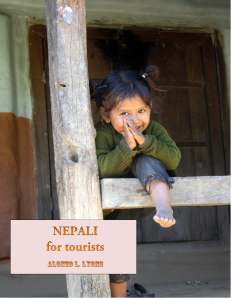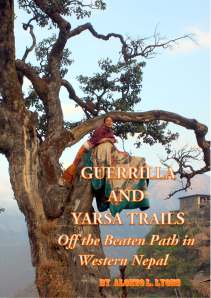
A brief yet thorough introduction to Nepal’s attractions and highlights. This guidebook is a must have for anyone visiting Nepal and covers everything from practical information for visitors (e.g., seasons, festivals, nightlife, health and safety) to cultural and natural treasures.
Nepal opened its borders in 1951. Mountain climbers were among the first to arrive, and the country quickly became beloved as a natural paradise with welcoming people, fascinating traditions and age-old customs.
Nestled in the Himalaya, Nepal is sandwiched between the two largest countries in history, India and China. On its northern border with the Tibetan Frontier, Nepal is graced with eight of the world’s ten highest peaks spiraling into the heavens! Over 27 million people call Nepal home and more than 50% of the population lives in the fertile, southern plains. Between these bountiful lowlands and the icy pinnacles of the north are lush mid-hills with enchanting villages surrounded by emerald and golden paddy fields.
With a captivating range of ecological and biological diversity and limitless opportunities for adventure and leisure, Nepal has something for everyone.
Whatever you come for (e.g., trekking, climbing, rafting, kayaking, mountain biking, paragliding, jungle safari, research, study, work, play), this guidebook provides the essentials for getting to know this fascinating Himalayan nation.
A visit to Nepal will be an exhilarating lifetime highlight!

A Tiny Little Insider's Guide to Pokhara, Second Edition (Updated August, 2014) with the latest details and highlights. Pokhara made easy for tourists and expatriates .
Pokhara is a lakeside Nirvana 200 km (125 mi) west of Kathmandu and a favorite of Nepali honeymooners and vacationers from all over the globe. The big city is stripped away at Lakeside – enjoy wide avenues and vistas of beautiful Phewa Lake shimmering in the sunlight. The surrounding lush scenery competes for your gaze and offers glimpses of Himalayan giants soaring into the heavens.
This laid-back tourist destination is a restful hub for deeper ventures into the Himalaya and post-trek rejuvenation as well as general holidaymaking and leisure with a vibrant restaurant, bar and live-music scene. Pokhara is ideal for letting go of worldly cares on a vacation in the Himalaya and this guide provides the essentials for making the most of Nepal’s Shangrila.
Exclusive information to this 2nd edition includes the following:
-Details on Hong Kong Bazaar ---a sprawling market popular with locals and reminiscent of Southeast Asia’s outdoor bazaars.
-Insider information about Maji Kuna – a hidden gem on the eastern shores of Begnas Tal where visitors can soak up the radiant surroundings on an isolated peninsula.
-Directions to Phewa Powerhouse below Phewa Park -- ideal for a picnic and the perfect place to get away and relish the surrounding natural paradise of plunging waterfalls, lush trees, citronella plants and trilling birdsong -- refresh with a dip in the river and get drenched by a waterfall shower.
-Recommended Restaurants, Pubs and Coffee Houses
And much more with specifics on Shanti Stupa, the Buddhist shrine built to promote world peace and trails to it. The pagoda's snowflake-white dome overlooks the Pokhara Valley and beyond as it twinkles atop evergreen Ananda Ridge. This hillside of dense jungle forms the southern border of Pokhara's Fewa Lake and is the first section of an exciting day-tour around the lake.
This edition provides descriptions of Pokhara's many highlights and treasures (e.g., Dihiko Patan, hidden Fewa Park and more)! A must read for anyone visiting Pokhara.
 The Best Little Guidebook for Trekking the Everest Region
The Khumbu (Everest Region of Nepal) is as good as it gets for mountain
scenery and Himalayan trekking. The area boasts more well-endowed
vistas than you will likely have in your entire life. This wondrous land
is populated by the hearty Sherpa following a timeless way of life.
Known as the 'Tigers of the Snow' for their aptitude at high elevations,
Sherpa are the local guardians of the Himalaya and trusted climbing
partners in the mountains that they consider divine.
The Best Little Guidebook for Trekking the Everest Region
The Khumbu (Everest Region of Nepal) is as good as it gets for mountain
scenery and Himalayan trekking. The area boasts more well-endowed
vistas than you will likely have in your entire life. This wondrous land
is populated by the hearty Sherpa following a timeless way of life.
Known as the 'Tigers of the Snow' for their aptitude at high elevations,
Sherpa are the local guardians of the Himalaya and trusted climbing
partners in the mountains that they consider divine.There is much to explore in this Sherpa homeland favored by Mother Nature including the historic Everest Base Camp, dazzling Gokyo Lakes, and the ambitious Three Passes Circuit (with secret Fourth Pass described within this guide) among numerous, inviting side-tours.
Trekking in the Everest Region is an exhilarating journey and non-stop feast of majestic peaks, cultural treasures and breathtaking attractions! The welcoming people, regal monasteries, radiant mountains, delicious home-style food and swill, along with a united nations of international travelers combine to make the Khumbu a trekkers’ paradise and lifetime highlight! (for Kindle Edition click here).
This guidebook is a must have for anyone visiting the Everest Region.
 Nepali for Tourists
Nepali for TouristsBasic Language for Tourists and Trekkers in Nepal with Nepali transliteration and Nepali Script (Devanagari).
The Guerrilla Trek and Yarsa Trails are an utterly unique experience.
Take an exhilarating odyssey through the heartland of post-conflict territory. This remote area where state forces clashed with Maoist rebels is now a tranquil land graced with many natural attractions that will compete for your attention every step of the way.
Visitors will experience ancient villages surrounded by trilling birdsong and emerald and golden paddy fields. This area has a robust range of eco-diversity including Dhorpatan Hunting Reserve, Nepal's only hunting reserve. Wildlife, waterfalls, rivers, caves, lakes, hot springs, yarsagumba hunting grounds and the inspiring, snow-topped Himalaya to the north make this region an adventurer’s Nirvana.
The cultural and natural treasures and attractions of The Guerrilla Trek and Yarsa Trails make for a lifetime highlight!
Annapurna Sanctuary and Circuit (paperback) (Kindle) Annapurna is the most popular of Nepal’s trekking regions, and for good reason. The area boasts Nepal's widest range of cultural, geographical, and biological diversity. Enjoy non-stop views of rugged landscaped and breathtaking mountain scenery.
Despite road-building since 2005 along the Annapurna Circuit, locals and tourism officials have been hard at work establishing alternate paths and exhilarating side-excursions.
NEW ATTRACTIONS outlined within this guidebook include the following:
-Khopra Danda and Mohare Danda, exceptional viewpoints to rival Poon Hill. Lodges at the summits offer a feast of jaw-dropping panoramas. Enjoy all the amenities and none of the crowds here.
-Khudi to Shyange along a new route high above the Marsyangdi River, a lesser-used passage through traditional villages with few of the tourists of the classic trekking highways.
-The Gurung Heritage Trail enters the heartland of Gurung country. Accommodations are traditional in picturesque villages surrounded by terraced fields.
-Kot Danda, aka, Paradise Ridge, is a luxuriant ridge top with cozy lodging away from the cares of the world.
Finally, The Annapurna Sanctuary is an astonishing amphitheater surrounded by a cirque of frosty peaks, nearly 360° of surrounding Himalayan goddesses.
***Route descriptions include the classic trails, alternate paths and exclusive new routes
***Side trips not found in other guidebooks
***Includes poem by David Whyte***Cover painting by Nicholas Roerich
The Indigenous Peoples Trail -- An enchanting mid-hills trail within the Mahabharat Range (also known as the Lesser Himalaya).
The culturally diverse route sees few tourists. Ethnicites prevalent along the way include Sherpa, Tamang, Thami, Majhi, Newar, and Yolmo. Among these groups, the Thami and Majhi are rarely encountered on trekking trails.
The Thami are unique to this region. With a total Nepalese population of around 30,000, their culture is considered endangered. The Majhi, with a Nepalese population of around 75,000, traditionally make a living near rivers through fishing and boating, mostly in the inner tarai along the southern fringes of Nepal.
The Indigenous Peoples Trail boasts vibrant panoramas of the snow-topped Greater Himalaya peaks at selected hilltop lookouts along the route. The highest elevation of the 6-7 day trek is 10,325 feet (3,147 m), and near the trail head. Thus, the top-down journey is easygoing and suitable for all seasons.
***Route descriptions include exclusive new routes
***Side trips not found in other guidebooks
***Detailed map
***Glossary with practical vocabulary and key phrases
***Cover painting by Nicholas Roerich
The Chitwan - Chepang Hills Trail -- This pristine journey (5 to 9 days) is an ideal choice for trekkers looking to get off the beaten path have a unique cultural experience in the mid-hills. Contour through remote landscape and rural Chepang villages that receive considerably fewer tourists than traditional trekking areas. Home stay here enables a deeper interaction with local people than can be had on more established routes.
Chepang have a distinct language of the Tibeto-Burman family and is one of the rare languages of the world that uses the duodecimal counting system with a base of twelve (rather than decimal with base of ten). This book provides the essentials for entering the heart of Chepang country.
***Route descriptions include exclusive new routes
***Detailed maps
***Side trips not found in other guidebooks
***Glossary with practical vocabulary and key phrases
***Cover painting by Nicholas Roerich
The Kathmandu Valley Rim and Beyond -- An exciting option for people who want to escape Kathmandu Valley, perhaps while waiting for a flight home or if a banda, a regional or national strike, brings transport to a standstill. Get away from it all on a 3-4 day excursion. Broad Himalayan panoramas complement the fresh air beyond the Shivapuri Ridge northeast of the valley. Lodging facilities are available, and some people choose to camp or find home stay possibilities.
The guide includes descriptions to Kathmandu valley’s two highest summits, Shivapuri (8963 feet, 2732 m) to the north, a sacred hangout of Shiva himself, and Phulchowki (9039 feet, 2755 m) to the south, the “Flower Fortress”.
Both mountains are lavishly camouflaged in vegetation and offer magnificent perspectives of the valley and the snow-capped Himalayan titans to the north.
***Comprehensive, compact and easy to use
***Detailed route descriptions
***Easy to use maps for Kathmandu and all Nepal
***Cover painting by Nicholas Roerich
The Tamang Heritage Trail and Langtang, Gosainkunda, and Helambu -- West of its famous neighbor, the Langtang Valley Trek, the Tamang Heritage Trail offers a scenic route through fascinating rural villages in the mid-hills. Himalayan panoramas might be more distant, but village scenery and home stay allows a deeper cultural experience than can be had on more established routes. Enjoy hot springs along the way to relax and rejuvenate.
The Tamang comprise 6 percent of the total population of Nepal, and they are the predominant inhabitants of this route. Tamang have a distinct language and manner of dress, ornamentation and craftsmanship, and many homes have elegantly carved window and door frames. This book provides the essentials for entering the heart of Tamang country.
Also includes Langtang, Helambu, and Gosainkunda, thrilling trekking destinations north of the Kathmandu Valley.
***Comprehensive and easy to use
***Route descriptions include the classic trails, alternate paths and exclusive new routes with detailed maps
***Includes Langtang, Helambu and Gosainkunda
***Side trips not found in other guidebooks
***Cover painting by Nicholas Roerich
The Gurung Heritage Trail -- Trekkers wishing to meet few other foreigners will enjoy The Gurung Heritage Trail. Village scenery and views of the Himalaya are breathtaking. The cultural interaction can be even more rewarding. This book provides the essentials for entering the heart of Gurung country and an inroad to the lifestyle of Nepal’s mid-hills.
Do this trek on its own, or follow the footsteps of most visitors and combine it with the world-renowned Annapurna Circuit, details outlined within.
***Route descriptions includes exclusive new routes
***Side trips not found in other guidebooks
***Detailed day-wise maps
***Glossary with practical vocabulary and key phrases
***Cover painting by Nicholas Roerich

No comments:
Post a Comment